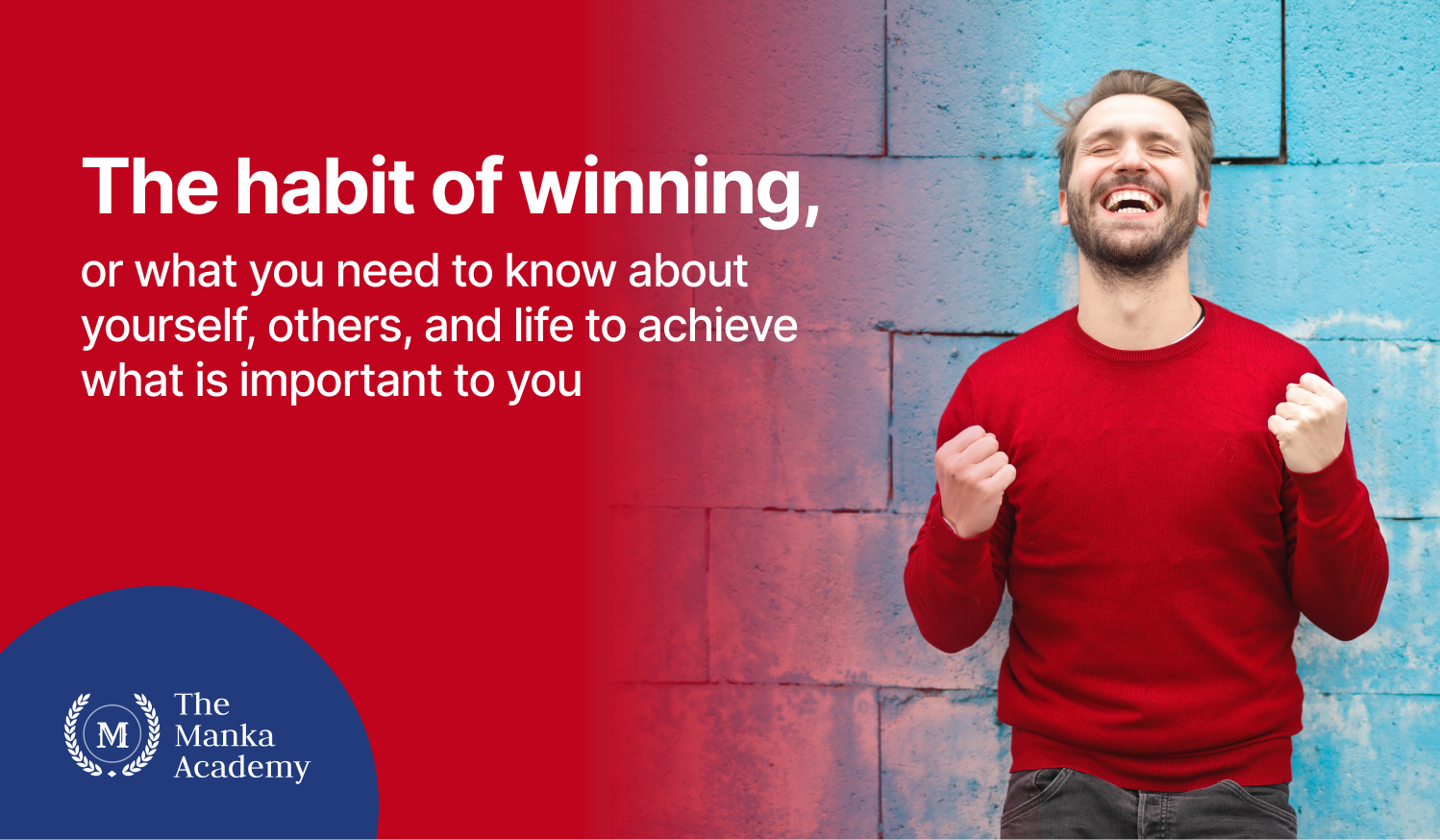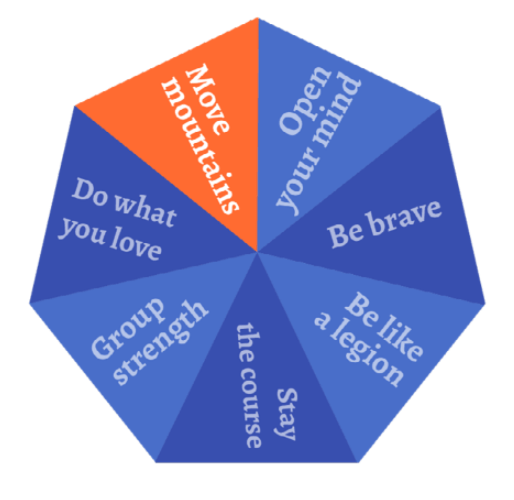The habit of winning, or what you need to know about yourself, others, and life to achieve what is important to you

Categories

Each of us has some habits. The good ones determine success, and the bad ones get us into trouble. Good habits are, for example, saving money, getting up early, eating healthy food, sharing, or persistent work. Bad ones include compulsive spending, overeating, watching TV every day, or procrastinating.
A habit is an automated action. A kind of mental autopilot. Forming a habit means that we do something in a way that does not require much intellectual or emotional effort.
It is commonly believed, and supported by psychology, that on average 28 days are needed to form a new habit. More time may be needed to develop more complex or difficult habits.
I started to pay more attention to habits ever since I read two books. The first is the cult work "The 7 Habits of Highly Effective People" by Stephen Covey, and the second is "8 to Be Great: The 8-Traits That Lead to Great Success" by Richard St. John.
Both of these books belong to the realm of success psychology, popularly known as personal development. Sometimes the term positive thinking is also used.
These fields do not yet have a very good reputation. They are often associated with brainwashing and manipulation in various motivational training sessions. Or, at best, they are considered of little intellectual value to business psychology. In my opinion, this is one of the reasons why we fail to achieve what we want, even when it is within our reach!
I believe so because achievements start with the courage to set ambitious goals. Another issue is the ability and determination to fulfill them. If you are comfortable with average results, the so-called normal life (i.e. you are satisfied with what most people around you are doing), and you believe that you should not "step out of line", this article is unlikely to arouse your enthusiasm.
However, if you are interested in how to be more effective in life and achieve what is important to you, you will probably find what follows to be intriguing and inspiring.
The fact is that when you are not properly motivated to take action, you will not succeed.
Whether you set out to save money, earn money, get promoted at work, raise your children, or fix your marriage, you need to be in excellent mental and emotional shape to achieve what you intend.
In order to achieve success, whatever success looks like for you, you must develop the habit of winning. This habit comes to the fore whenever you are finishing a project, planning carefully every day, or maintaining iron discipline in executing a plan.
Here's what you gain when you make winning a habit.
If you are stuck in debt, you will understand why and develop an effective plan to overcome your financial troubles once and for all.
If you want to improve your productivity, you will learn how to maximize every day. If you have a negative attitude to life, or are plagued by anxiety and fears, you will learn how to replace them with courage and faith.
You will learn how to spot, create, and seize professional or business opportunities.
You will learn to apply the golden rules of productivity.
You will discover an entrepreneurial spirit in yourself.
You will fully harness your productivity.
You will develop the art of making effective decisions in business and finance.
Everyone already has everything they need to achieve what is important to them!
According to one of the greatest minds in history, Aristotle, "we are what we repeat in our lives" and "excellence is not a one-time act but a habit".
So if you really want to achieve something extraordinary, something meaningful and great, then you need to make some permanent changes in your life. First, you need to work on your mindset, and then your daily rhythm.
I love upgrading my life and making regular improvements.
Over the past few years, I’ve made some significant changes, to mention just a few. I became a husband to a wonderful woman and a father to two adorable children. I quit smoking and gave up various stimulants and relaxants after years of less-than-wise choices. I overcame the burden of massive debt and authored several books and online courses on business and personal finance, which led me to regularly create blogs, workshops, and screenplays. I also mastered international sales within three months, overcoming my initial aversion to sales—likely rooted in my humanities background. Additionally, I became an NLP Practitioner and took up running regularly, completing marathons in London, Warsaw, and Athens.
Looking for a deep and ultimate meaning in life has been my obsession for as long as I can remember. After many years of exploring postmodern, liberal, and left-leaning ideologies—and flirting with the atheist ideas of Richard Dawkins and Christopher Hitchens—I was baptized and became a follower of Jesus.
These are just some of my recent transformations.
Every strategy I use with others has been thoroughly tested and proven through my own experiences.
The winning habit is quite complex and consists of 7 elements:
1. Move mountains
The ability to "move mountains" is your belief that what you set out to do is achievable. This is an incredibly important part of any project, venture, or plan. If you lack self-belief, then your chances of success are slim.
As Guy Kawasaki, an entrepreneur, influencer, and one of the most interesting figures in the world of modern marketing put it, “it's not facts that move mountains but faith.”
Faith is not just a state of mind, it's also – or perhaps above all – action. When I believe that I can accomplish something, that my idea is feasible, I get to work.
And then I will not stop until I complete the project. This is faith. If you are a person who tends to have doubts and look for holes in everything, I have good news: faith is like a muscle that you can develop with regular exercise.
2. Open your mind
The prerequisite for self-development and achieving ambitious goals is the constant increase of your competence and skills. For this, you need an open mind. A mind set on learning.
You need to be humble to maintain an open mind. Shunryu Suzuki, the famous popularizer of Zen in the West, observed that "in the beginner's mind there are many possibilities; in the expert's mind there are a few." Therefore, no matter how much we achieve and expand our knowledge, it is incredibly important to remain in a creative, open state of mind with a willingness to learn. Especially since knowledge is, to some extent, an illusion. Even in ancient times, the brilliant philosopher Socrates declared the famous "scio me nihil scire", meaning, I know that I know nothing. He recognized that what we know is only a small fraction of what it is possible to know.
And yet our problem, so commonly, is arrogance. Often, after achieving some success, we rest on our laurels and bask in the belief that we are great, smart, and special. As a result, we look down on others. Yes, each of us is great and smart and special, but only if we resist such weaknesses, to stay in a growth and learning mindset.
3. Be brave
Most of the time we do not even start working towards our goals because we lack courage. An interesting property of courage is that it is active and available regardless of our feelings. I can be afraid and yet still act. I can be very afraid and force myself to move forward.
You cannot be courageous if you are not afraid because if you are not afraid, you have no need for courage.
Feelings are important, but our rational mind should be our guide. Effective decisions are made on a rational rather than an emotional level.
Portuguese author and Nobel Prize winner José Saramago wrote that "the best guardian of the vineyard is the fear of the guardian, so it is always a good idea to overcome the fear first and only then worry about the guardian."
4. Be like a legion
In high school, I was in a humanities class and one of my favorite areas of study was history. I was particularly impressed by the accomplishments of the ancient Greeks. So, when I learned that in 146 BC the Romans finally defeated the Greeks at the Battle of Corinth, I began to study Roman martial arts very intensively. I wanted to learn more about those who had conquered the admirable Greeks.
The Romans created the most effective army in history. Its essence was robust organization, discipline, and tactics. Each legion functioned with this iron discipline.
No matter how talented you are, you must also be disciplined. You must have the will to complete the tasks you set for yourself. The strength to overcome your own laziness, fears, and doubts.
5. Stay the course
You have probably been on a plane during turbulence. Despite such difficulties, modern airplanes overcome various obstacles and almost always arrive at their destination. This is due to planning, testing, refining, and, finally, sticking to the designated routes. The process is a good metaphor for planning our endeavors.
It often happens that we have to deviate slightly from the planned course or change some parameters and coordinates, but it is important to remember the goal. To focus on where we are going.
I love the metaphor of flight in relation to business projects, finance, or planning in general. I read about it in Brian Tracy's “Flight Plan”, a book I would highly recommend.
6. Group strength
The synchronized and rationally organized effort of several people brings incomparably more results than working completely alone. Even if you are a poet, philosopher, or artist who is fulfilled in solitude, you still need at least a few trusted people with whom you can share your discoveries and exchange observations and comments.
Surrounding yourself with the right people creates the right environment for success. Always interrogate your plans and ideas with those who have achieved a lot themselves.
On the other hand, if you want to start your own business, it is best not to ask for advice from colleagues who have always been traditionally employed.
I recommend you pay attention to the term “Brain Trust”. It was created during Franklin Roosevelt's presidency to denote a group of advisors. Roosevelt is the president who led the United States out of the Great Depression of the 1930s, the greatest economic crisis in modern history, and held office during the hellishly difficult times of World War II.
7. Do what you love, but make sure you know what love is
There is one dangerous myth that needs to be banished from our way of thinking. It is the belief that we have to love what we do. We don't! Or, at least, not in the way most of us think.
The idea of "loving what we do" dates back to the 19th century, when Mark Twain declared, "find a job you enjoy doing, and you will never have to work a day in your life."
Sounds fantastic, right? It is fine as a popular meme on Facebook, or for the motto of some motivational essay. However, it is not at all easy to translate such a maxim into practical action, into everyday work.
"Do what you love. Love what you do." Such slogans have been repeated in recent years by millions of people around the world, including by business giants like Steve Jobs. As is usually the case, the wider usefulness depends on how you define and interpret what you read.
For example, what does "love" mean to you? Perhaps it would be more effective to tell myself that what I do is supposed to be useful? Would I like everyday work to benefit both myself and others?
Personally, I would suggest using language that is more practical and understandable in our daily struggles.
Most of us do not particularly love, for example, our rather boring and schematic personal finances. We tend to have an ambivalent attitude toward money. And this ambivalence makes it virtually impossible to make more money, becoming a serious obstacle to financial freedom.
The solution to this problem is to redefine "love" and "loving". Remember that love is a decision in the long run and not a feeling. When you love someone, in the beginning, the most important thing is that wonderful unique feeling of "being in love."
But as things progress, it is your decision to love, no matter how difficult it may be or how much it may cost you, that causes the relationship to blossom.
The greatest successes begin with a proper understanding of what is important to us. And expanding our language to encompass these values. For, as Ludwig Wittgenstein, the brilliant 20th-century thinker, said, "the limits of my language mean the limits of my world."
Want more from life?
Expand your language first. Change your perspective. Test different options. Work on your perception of reality. Our course will help you navigate these developments.
What kind of attitude you have every day, and how you deal with complexity or adversity, are the key factors in your success. It is so important to take care of your own development.
Andrzej Manka


